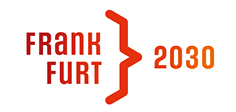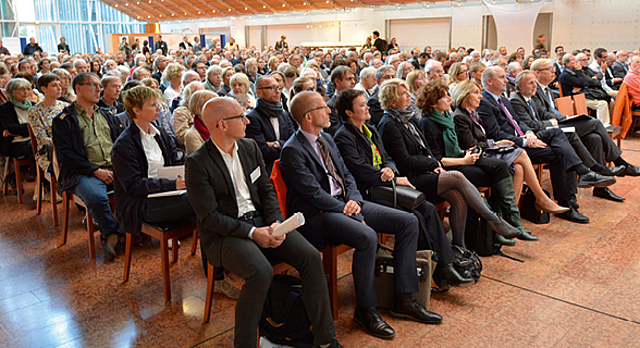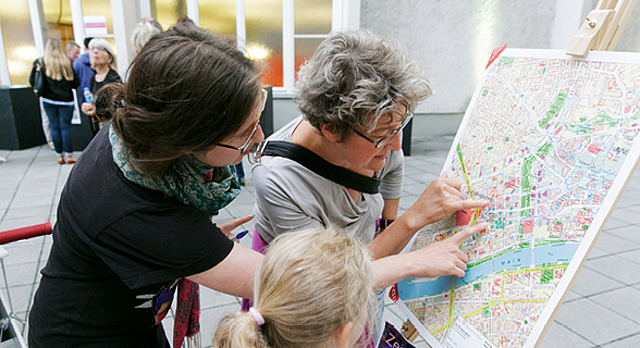Project Profile
Project Title: „Frankfurt 2030“
Subject Cluster: Planning and Construction
Project Objectives: Clarifying the main features of planned urban development, working out strategies for functional and spatial future development of the city.
Project Start: 2014
Project Completion: 2017
Overall Responsibility and Project Management: Department of Planning and Construction and City Planning Office Frankfurt am Main
Project Participants: interdepartmental project group Frankfurt 2030
Project Support: Ernst Basler + Partner AG
Dynamically growing, open, social: which urban developments should Frankfurt adopt to ensure the city remains liveable and economically prosperous? With “Frankfurt 2030”, the integrated urban development concept, the city has formulated goals and strategies for an inter-sectoral approach with interaction between the many different aspects of urban development.
On May 22 2014, the Frankfurt City Council instructed the Magistrate to draw up an integrated urban development concept which would identify the parameters for urban development until 2030. A spatial development strategy would show how these objectives can be attained.
The project focuses on the question of which areas should be used for which purposes. It includes developing residential building land and open spaces while respecting the interests of Nature, the landscape, the environment and the further development of the social, transport and technical infrastructure.
This predominantly structural-spatial, infrastructural perspective is complemented to some extent by an analysis of the social, economic and cultural framework for urban development – but without presuming to portray in detail the complexity of the urban society and the heterogeneous nature of life in Frankfurt.
As an aid to orientation and as guidelines for the contents of the project, on October 2nd 2015, the Magistrate agreed on key elements of future urban development. The basic principles of the urban development were formulated under the headings „growing city, open and social city, liveable city, prosperous city, resource-efficient city, mobile in the city, learning city, regional city“.
Taking stock: challenges and trends
At the start of 2015 an interdepartmental working group from the city administration, in cooperation with the commissioned planning office of Ernst Basler + Partner AG, Zürich, began work on the project. By September 2015 there was an initial assessment in the subject areas
• Population/Social /Integration
• Settlement structure and Reserves
• Housing and Housing Environment,
• Leisure and Culture
• Economy and Employment
• Landscape /Open Spaces/Urban Climate
• Environment and Health
• Energy and Environment
• Education
• Mobility and Traffic
• Region.
Current challenges, trends and the driving forces behind urban development were assessed in each area. Programmes and sectoral planning of the City of Frankfurt were included which already exist in these fields or are currently being drawn up.
Growth, diversity and networking
The central findings were compiled in SWOT analyses (strengths, weaknesses, opportunities and threats) and, wherever possible, represented graphically. On 28th September 2015, the findings were presented to the public at an evening event. About 500 participants discussed the current situation and future challenges for Frankfurt with City employees. The findings of the individual groups were then correlated in an integrated analysis.
It became apparent that the central question was: which challenges arise from dynamic urban growth, from the growing diversity and needs of the urban population and the ongoing networking.
Synergies and conflicts between topic areas
Reviewing the trends also shows that, since almost all the areas interact, urban development is more than the sum of the developments in the individual areas. This leads to urban conflicts and synergies which are already identifiable or foreseeable today.
Integrating the know-how and standpoints of the urban society
The integrated urban development concept includes intensive public participation. Citizens, specialists and stakeholders contribute their know-how and their standpoints to create a sustainable concept. A status report available at www.frankfurtdeinestadt.de serves as the basis for dialogue on the initial situation and the challenges of future urban development. There is also detailed information about the project and opportunities for participation.

Taking stock
Analysing challenges, trends and the driving forces behind urban development in a wide range of subject areas; integrating ongoing programmes and planning.

Integrated approach
Correlating the findings of the analysis in the subject areas; an integrated approach points out interactions which can lead to conflicts and synergies.





